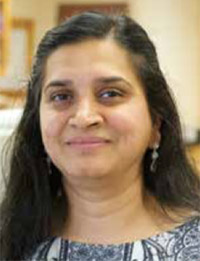Lalitha Jayant

Professor
Science
EMAIL: ljayant@bmcc.cuny.edu
Office: N-699P
Office Hours:
Phone: +1 (212) 776-6883
Professor Lalitha Jayant is an expert in cell and molecular biology as well as biochemistry.
Jayant works with the sea urchin Lytechnius variegatus and marine bacteria associated with this urchin. One of her research projects involves extending the shelf-life of sea urchin eggs for laboratory use using liposomes. Given the limited life span of isolated eggs from L. variegatus, one aim of this work has been to make sea urchin gametes more readily available and useful for developmental research and for class experiments in Biology labs. Another aspect of her research is to isolate and identify marine bacteria associated with these urchins. Some of these bacteria harbor plasmids and some produce agar and alginate degrading enzymes. Research projects focus on characterizing these bacteria and their plasmids.
Expertise
General Biology and Microbiology Experiments, Detection of Bacterial Contamination in Dried Fish Samples.
Degrees
Courses Taught
- This two-semester course acquaints students with the basic properties of living systems: metabolism, growth, responsiveness and reproduction at the cellular and organism levels as illustrated by assorted plants and animals. Two terms required.
Corequisite for BIO 210 is ENG 101 and any 100-level math course or higher, excluding MAT 150.5 and MAT 161.5
Prerequisite for BIO 220 is BIO 210 and any 100-level math course or higher, excluding MAT 150.5 and MAT 161.5
Course Syllabus - This two-semester course acquaints students with the basic properties of living systems: metabolism, growth, responsiveness and reproduction at the cellular and organism levels as illustrated by assorted plants and animals. Two terms required.
Course Syllabus - The goal of this course is to provide students with a detailed understanding of the molecular mechanisms underlying cellular processes introduced in BIO 210/220 a?? the structure, function and specializations of the cell. This will be accomplished through a combination of lecture and laboratory sessions providing both theory and application. The course will include study of subcellular structure and function, gene expression, protein activity, cell regulation and cell-to-cell communication.
Prerequisite: BIO 220 and CHE 202
Corequisite: CHE 230
Course Syllabus - Micro-organisms pathogenic to humans: their characteristics, pathogenicity and modes of transmission are studied. Instruction includes a study of the sterile technique and maintenance of the sterile field. Required in selected programs in the Health Sciences; available to other students through Departmental approval.
Prerequisites: BIO 426 and CHE 118, or CHE 121, or departmental approval
Course Syllabus
Research and Projects
Publications
- Jayant, L., Priano, C., Salm, S., and Goodwyn, L. The Fun in Fermentation: A Laboratory Case Study. Accepted for publication Sept. 9, 2015 in the National Center for Case Study Teaching in Science, University at Buffalo, State University of New York Jaya,
Honors, Awards and Affiliations
- NSF: Grant title: Broadening STEM Participation Among Minority Students in an Urban Community College S-STEM Program. Period of funding 2016-2021 (Total amount $999,998)
- CUNY/ASAP Grant title: Redesigning STEM gateway courses to reduce Attrition rates. Period of funding 2017 (Total amount $40,000) BMCC: Grant title Publication Grant. Period of funding 2014-2015 ($5000) New York State Education Department; Grant title

